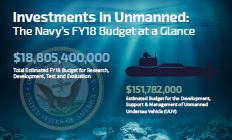Exclusive Content
The Future of Unmanned Maritime Systems: Achieving Full Autonomy
In this exclusive interview, Guy Thomas goes in depth to discuss the current level of autonomy and design in existing unmanned maritime systems, the new opportunities and capabilities that come from operating in deeper sea levels, the future of unmanned maritime systems and an outlook on the challenges that will need to be overcome to reach full autonomy.
How will the Navy's FY19 Budget Impact Unmanned Maritime Initiatives?
We took a look how the Navy's FY19 Budget Request is going to impact current maritime initiatives. As program officials face pressure to speed up the acquisition of new capabilities, the Navy is moving forward with a number of unmanned undersea vehicles and unmanned service vehicle projects. Relative to domain of operation, unmanned maritime vehicles are scheduled to receive $1.3 billion in 2019 funding. Download this infographic to find out where the funds are being allocated.
Past Presentation Packet
In preparation for the 2018 Unmanned Maritime Systems Summit, we wanted to exclusively share these past presentations with you. Below you will find expert content on:
- US Naval Warship Engineering Priorities: Dr. Edward S. Ammeen, Ph.D Director for Marine Engineering, Naval Sea Systems Command US Navy
- GE Marine Gas Turbine Propulsion for Frigates: George Awiszus, Director of Military Marine Marketing, General Electric
- Impacts On The U.S. Navy’s Ship Capability Strategy: Gloria L. Valdez, Deputy Assistant Secretary of the Navy (Ships), Office of the Assistant Secretary of the Navy Research
- DARPA’s Activities in Relation to UUV, USV and Mission Systems: Dr. Jim Galambos, Program Manager, Strategic Technology Office, DARPA
- Methods to Modernize the Fleet Using Information Warfare Tools: Captain William Lintz, Commanding Officer – Center for Information Warfare Training, U.S. Navy
The CMRE’s Role in Increasing Skills & Investment in Ocean Science to Protect NATO’s Strategic Maritime Priorities
Navy's across the world are shifting their strategic thinking into oceanographic and hydrographic vessels, ocean systems, submarines and maritime unmanned vehicles to enable maritime dominance over adversaries. NATO's Center for Maritime Research and Experimentation (CRME) is leading the research and experimentation of new technologies in ocean science to address security and defense issues within NATO countries. Dr. Warner, Director of the NATO Center, gave insight on the role of the CRME, how the Center supports NATO's maritime strategic interests and is strengthening relationships across sectors, and addresses the potential of new technologies in this operational environment.
Multi-role Naval Vessels & Submarines: A Security Necessity?
Unmanned Maritime Systems Market Report
This report addresses the increasing investment into oceanographic and hydrographic survey vessels, autonomous systems and ocean intelligence assets, providing greater context to the discussions to take place at the Unmanned Maritime Systems Summit.
Investments in Unmanned: The FY17 Budget at a Glance | 3rd Unmanned Maritime Systems
Take a glance at the spending in the fiscal year 2017 Defense Budget. And see why the Navy is allocating a total of $70 million for four different unmanned undersea vehicle (UUV) and unmanned surface vehicle (USV)procurement programs.








